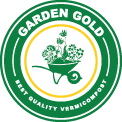- Garden Gold
- FAQ
FAQ
What is vermicompost?
Vermicompost is a nutrient-rich organic fertilizer and soil conditioner produced through the decomposition of organic matter by earthworms. It is also known as worm compost or worm castings.
What are the benefits of using vermicompost?
What types of worms are used in vermicomposting?
The most commonly used worms are Red Wigglers (Eisenia fetida) because they thrive in organic material and reproduce quickly.
What materials can be used for vermicomposting?
How do I start a vermicomposting bin?
1 Choose a Container: Select a suitable bin with proper aeration and drainage.
2 Add Bedding: Use moist bedding material like shredded newspaper or straw.
3 Add Worms:Introduce Red Wigglers to the bin.
4 Add Organic Waste:Waste: Bury food scraps under the bedding.
5 Maintain:Keep the bin moist and at an optimal temperature.
How do I maintain a vermicomposting bin?
How long does it take to produce vermicompost?
It typically takes 2-3 months for the organic material to be fully converted into vermicompost.
How do I harvest vermicompost?
How do I use vermicompost?
What are common problems in vermicomposting and how can they be resolved?
Can vermicompost be used for all plants?
Default AnswerYes, vermicompost is beneficial for a wide range of plants, including vegetables, fruits, flowers, and ornamental plants. It provides a balanced supply of nutrients and improves overall soil health. By following these guidelines, you can successfully manage a vermicomposting system and enjoy the many benefits of this natural, sustainable practice. For more information or to purchase high-quality vermicompost, visit Garden Gold Vermicompost Manufacturing based in Mogar, Anand, Gujarat.
Transport Related FAQ
Do you supply vermicompost outside of Gujarat?
No, currently we only supply our vermicompost within the state of Gujarat, India.
How is the transportation of vermicompost handled?
Transportation is managed separately by the customer. Once your order is ready, we will notify you for pickup or you can arrange for a transport service to collect your order from our facility in Mogar, Anand, Gujarat.
What are the transportation costs?
Transportation costs vary depending on the distance, quantity of vermicompost, and the chosen transport service. The customer is responsible for covering these costs directly with the transport provider.
How is the vermicompost packaged for transport?
Our vermicompost is packaged in sturdy, durable bags of 5 kg, 25 kg, and 50 kg to ensure safe handling and transportation. Proper packaging helps prevent spillage and damage during transit.
Is there a minimum order quantity for transportation?
Yes, since we deal in wholesale orders, there is a minimum order requirement. Please contact us for specific details regarding minimum order quantities.
Can I pick up the order myself?
Yes, you are welcome to pick up your order directly from our facility in Mogar, Anand, Gujarat. Please ensure you have suitable transportation to carry the quantity of vermicompost ordered.
